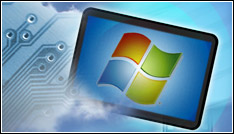More features of Windows 8 have apparently seeped out, courtesy of an early build that leaked onto the web.
“A new build of Windows 8, build 7989, has surfaced,” the blog Redmond Pie reported on 18 June. “Slowly but surely, it’s finding its way onto file-sharing sites, and some Windows enthusiasts have already dug deep into it.”
Virtual keyboard
Features discovered in the build supposedly include a redesigned virtual keyboard and SMS (Short Message Service) support. The keyboard features an option that splits it into two halves, for easier thumb-typing on a tablet. “Microsoft has also built emoticon support directly into the keyboard user interface and feedback sounds similar to Windows Phone,” Winrumors’ Tom Warren wrote in an 18 June posting, which also included a supposed video of the keyboard in action.
To be fair, a variant of Windows 8’s ergonomic, “thumbs optimised” keyboard has been glimpsed before, so that particular feature’s presence in the early build comes as no enormous surprise.
Redmond Pie also detailed Windows 8’s coding for an App Store and the ability to unlock certain features. “While it’s still no indication on what Microsoft plans to do with this, per-feature licensing could do away with Windows editions,” read its posting. “Instead, all users would start with a single, ‘bare bones’ edition of Windows and purchase individual features as they saw fit.”
Microsoft tried something similar with Office 2010, offering a free, stripped-down, ad-supported version of the productivity suite pre-installed on certain PCs. A single-use license on a plastic card, purchased from a retailer such as Best Buy, would unlock the fully functional version of Office 2010.
In keeping with Microsoft’s intention to port Windows 8 onto a number of form factors, the early build of the operating system also apparently contains code indicative of SMS support.
Getting into tablets
“Windows 8” is a code name for the next-generation version of Microsoft’s bestselling operating system, and its name could change before the final release, generally rumoured for later in 2012.
During this past January’s Consumer Electronics Show, Microsoft revealed that Windows 8 would support system-on-a-chip architecture, in particular ARM-based systems from partners such as Qualcomm, Nvidia and Texas Instruments. That should give Microsoft the ability to port the next version of Windows onto tablets and other mobile form factors – and, in the process, establish the company’s beachhead in the tablet space, where it faces aggressive competition from the likes of Apple’s iPad and the growing family of Google Android touch-screens.
Whereas previous versions of Windows embraced the “traditional” format of a desktop with folders, paired with a taskbar and “Start” button, Windows 8’s user interface centres on a set of colorful tiles that open up applications – a design that draws many of its visual cues from Windows Phone, Microsoft’s latest smartphone operating system.
On the competitive front, Windows 8 will face not only Apple’s Mac OS X, which is also taking design cues from mobile operating systems, but also Hewlett-Packard’s webOS on PCs and tablets.





